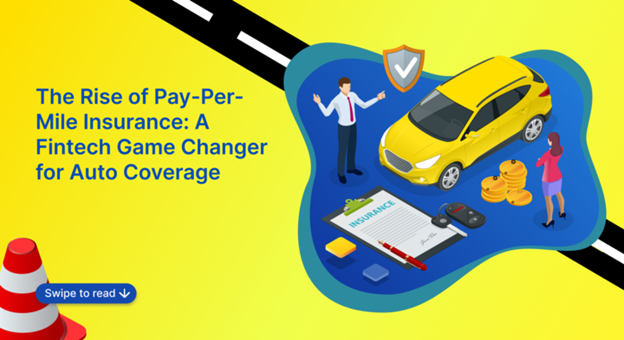
In an era of rapid technological advancement, the insurance industry is not one to be left behind. One of the most exciting innovations in the world of insurance is the rise of Pay-Per-Mile (PPM) insurance. This innovative approach to auto coverage is not only revolutionizing the way we think about car insurance but also benefiting both insurers and policyholders. In this blog post, we will explore the concept of Pay-Per-Mile insurance and how it is reshaping the fintech landscape.
The Traditional Auto Insurance model

Traditionally, auto insurance has been a fixed-cost service, with policyholders paying a predetermined premium every month or annually, regardless of how much they actually drive. This system has its flaws. For many, it results in overpaying for coverage, especially if they don’t drive their cars frequently. Additionally, this one-size-fits-all approach doesn’t consider individual driving habits, which can vary widely.
Pay-Per-Mile Insurance
Pay-Per-Mile insurance, often referred to as Usage-Based Insurance (UBI), takes a different approach. It uses telematics technology to monitor how many miles a policyholder drives and calculates premiums accordingly. This means that individuals who drive less pay less, and those who drive more pay more, aligning the cost of insurance with actual usage. Here’s how it works:
Telematics devices: Policyholders are equipped with a telematics device that tracks their driving behavior. This device records data such as miles driven, speed, acceleration, and braking patterns.
Personalized premiums: Insurance companies use the data collected from the telematics device to determine the policyholder’s risk profile. Safer drivers who drive fewer miles may enjoy significantly lower premiums compared to traditional insurance rates.
Real-time insights: Policyholders often have access to real-time data about their driving habits through mobile apps or online portals, promoting safer driving practices.
The advantages of Pay-Per-Mile Insurance

1. Cost savings
One of the most apparent benefits of PPM insurance is cost savings. If you are someone who uses your car infrequently or for short trips, you stand to save a substantial amount on your insurance premiums. This flexibility makes it an attractive option for urban dwellers, remote workers, and retirees.
2. Fair pricing
PPM insurance promotes fairness in pricing. Your premiums are directly tied to your actual usage and driving habits, rather than being based on generic demographic data. This encourages safer driving and rewards responsible motorists.
3. Environmental impact
Reduced driving leads to lower carbon emissions. Pay-Per-Mile insurance incentivizes people to drive less, which can contribute to a positive environmental impact by reducing air pollution and congestion.
4. Data-Driven insights
Telematics data provides valuable insights into your driving behavior. Policyholders can use this data to improve their driving skills and potentially reduce their risk of accidents.
The Fintech connection
Pay-Per-Mile insurance owes much of its success to fintech innovation. The integration of telematics technology with financial services has created a seamless and efficient system for both insurers and policyholders. Here’s how fintech is making it happen:
1. Digital onboarding
Fintech streamlines the policy application process. Policyholders can sign up for PPM insurance online, and the telematics device can be easily installed in their vehicles, often with step-by-step guidance through a mobile app.
2. Real-time data processing
Fintech platforms can process and analyze the vast amounts of data collected by telematics devices in real-time, allowing insurers to adjust premiums quickly and accurately based on actual driving behavior.
3. Mobile access
Policyholders can access their insurance information, driving data, and premium calculations through mobile apps, offering convenience and transparency.
The future of auto coverage
As technology continues to advance and consumer preferences evolve, Pay-Per-Mile insurance is likely to become even more prevalent. This model not only benefits consumers but also helps insurers make more informed underwriting decisions. It’s a win-win situation that is transforming the auto insurance landscape and creating a brighter, more sustainable future for both the industry and the planet.
In conclusion, Pay-Per-Mile insurance is proving to be a fintech game changer for auto coverage. It’s fair, flexible, and environmentally friendly. As more insurers embrace this innovative approach, we can expect to see a shift toward personalized, data-driven auto insurance that benefits us all. So, if you’re looking to save money and drive more responsibly, Pay-Per-Mile insurance might just be the right choice for you.
Interested in integrating technologies to your insurance business to drive it in the path of success? Agira Technologies is here to serve you with better minds, who can provide you with better tech support for your insurance processes. Want us to elaborate more? Text us “HI”.
Fintech and AI/ML services at Agiratech
- Claims Processing
- Claims Fraud Detection
- Claims Adjudication
- Automated Underwriting
- Submission Intake
- Pricing and Risk Management
- Policy Servicing
- Insurance Distribution
- Product Recommendation
- Property Damage Analysis
- Automated Inspections
- Customer Lifetime Value Prediction
- Speech Analytics
- Customer Segmentation
- Workstream Balancing for Agents
- Self-Servicing For Policy Management
- Claim Volume Forecasting
Want to discuss more on Fintech? Come and meet us here. 1604 US Highway 130 Suite 101, North Brunswick, NJ 08902





